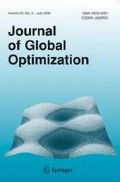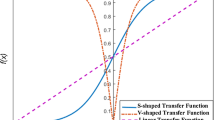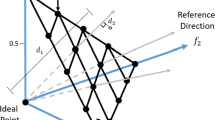Abstract
The majority of Combinatorial Optimization Problems (COPs) are defined in the discrete space. Hence, proposing an efficient algorithm to solve the problems has become an attractive subject in recent years. In this paper, a meta-heuristic algorithm based on Binary Particle Swarm Algorithm (BPSO) and the governing Newtonian motion laws, so-called Binary Accelerated Particle Swarm Algorithm (BAPSA) is offered for discrete search spaces. The method is presented in two global and local topologies and evaluated on the 0–1 Multidimensional Knapsack Problem (MKP) as a famous problem in the class of COPs and NP-hard problems. Besides, the results are compared with BPSO for both global and local topologies as well as Genetic Algorithm (GA). We applied three methods of Penalty Function (PF) technique, Check-and-Drop (CD) and Improved Check-and-Repair Operator (ICRO) algorithms to solve the problem of infeasible solutions in the 0–1 MKP. Experimental results show that the proposed methods have better performance than BPSO and GA especially when ICRO algorithm is applied to convert infeasible solutions to feasible ones.
Similar content being viewed by others
References
Cook W.J., Cunningham W.H., Pulleyblank W.R., Schrijver A.: Combinatorial Optimization. Springer, Berlin (1997)
Neapolitan R., Naimipour K.: Foundations of Algorithms Using C++ Pseudo Code, 3rd edn. Jones and Bartlett, Massachusetts (2004)
Chu P.C., Beasley J.E.: A genetic algorithm for the multidimensional knapsack problem. J. Heuristics 4(1), 63–86 (1998)
Snyder L.V., Daskin M.S.: A random-key genetic algorithm for the generalized traveling salesman problem. Eur. J. Oper. Res. 174, 38–53 (2006)
Din D.: Heuristic and simulated annealing algorithms for wireless ATM backbone network design problem. J. Inf. Sci. Eng. 24, 483–501 (2008)
Andresen M., Bräsel H., Mörig M., Tusch J., Werner F., Willenius P.: Simulated annealing and genetic algorithms for minimizing mean flow time in an open shop. Math. Comput. Model. 48, 1279–1293 (2008)
Engin O., Döyen A.: A new approach to solve hybrid flowshop scheduling problems by artificial immune system. Future Gener. Comput. Syst. 20(6), 1083–1095 (2004)
Du W., Du H., Li M.: Hyper-mutation antibody clone algorithms for TSP. J. Xidian Univ. 36, 527–534 (2009)
Kong M., Tian P., Kao Y.C.: A new ant colony optimization algorithm for the multidimensional Knapsack problem. Comput. Oper. Res. 35(8), 2672–2683 (2008)
Yang J., Shi X., Marchese M., Liang Y.: An ant colony optimization method for generalized TSP problem. Prog. Nat. Sci. 18(11), 1417–1422 (2008)
Labed S., Gherboudj A., Chikhi S.: A modified hybrid particle swarm optimization algorithm for multidimensional knapsack problem. Int. J. Comput. Appl. 34(2), 11–16 (2011)
Shi X.H., Liang Y.C., Lee H.P., Lu C., Wang Q.X.: Particle swarm optimization-based algorithms for TSP and generalized TSP. Inf. Process. Lett. 103(5), 169–176 (2007)
Fadlaoui K., Galinier P.: A tabu search algorithm for the covering design problem. J. Heuristics 17(6), 659–674 (2011)
James T., Rego C., Glover F.: Multistart tabu search and diversification strategies for the quadratic assignment problem. IEEE Trans. Syst. Man Cybern. Part A 39(3), 579–596 (2009)
Zhu W., Curry J., Marquez A.: SIMD tabu search for the quadratic assignment problem with graphics hardware acceleration. Int. J. Prod. Res. 48, 1035–1047 (2009)
Leung Y., Gao Y., Xu Z.B.: Degree of population diversity—a perspective on premature convergence in genetic algorithms and its Markov chain analysis. IEEE Trans. Neural Netw. 8(5), 1165–1176 (1997)
Hrstka O., Kučerová A.: Improvements of real coded genetic algorithms based on differential operators preventing premature convergence. Adv. Eng. Softw. 35, 237–246 (2004)
Moslemipour G., Lee T.S., Rilling D.: A review of intelligent approaches for designing dynamic and robust layouts in flexible manufacturing systems. Int. J. Adv. Manuf. Technol. 60, 11–27 (2012)
Gao W.F., Liu S.Y., Huang L.L.: Particle swarm optimization with chaotic opposition based population initialization and stochastic search technique. Commun. Nonlinear Sci. Numer. Simul. 17(11), 4316–4327 (2012)
Mendes R., Kennedy J., Neves J.: The fully informed particle swarm: simpler maybe better. IEEE Trans. Evol. Comput. 8(3), 204–210 (2004)
Liang J.J., Qin A.K., Suganthan P.N., Baskar S.: comprehensive learning particle swarm optimizer for global optimization of multimodal functions. IEEE Trans. Evol. Comput. 10(3), 281–295 (2006)
Zhan Z.H., Zhang J., Li Y., Chung H.S.: Adaptive particle swarm optimization. IEEE Trans. Syst. Man Cybern. Part B 39(6), 1362–1381 (2009)
Holland J.H: Adaptation in Natural and Artificial Systems. The University of Michigan Press, Ann Arbor, Michigan (1975)
Lau H.C.W., Chan T.M., Tsui W.T., Pang W.K.: Application of genetic algorithms to solve the multidepot vehicle routing problem. IEEE Trans. Autom. Sci. Eng. 7(2), 383–392 (2010)
Ahuja P.K., Orlin J.B., Tiwari A.: A greedy genetic algorithm for the quadratic assignment problem. Comput. Oper. Res. 27((10), 917–934 (2000)
Zhang Q., Manier H., Manier M.A.: A genetic algorithm with tabu search procedure for flexible job shop scheduling with transportation constraint and bounded processing times. Comput. Oper. Res. 39, 1713–1723 (2012)
Lee Z.J., Su S.F., Chiang C.C., Liu K.H.: Genetic algorithm with ant colony optimization (GA-ACO) for multiple sequence alignment. Appl. Soft Comput. 8(1), 55–78 (2008)
Defersha F.M., Chen M.Y.: A hybrid genetic algorithm for flowshop lot streaming with setups and variable sublots. Int. J. Prod. Res. 48(6), 1705–1726 (2010)
Kirkpatrick S., Gelatto C.D., Vecchi M.P.: Optimization by simulated annealing. Science 220, 671–680 (1983)
Defersha F.M., Chen M.: A simulated annealing algorithm for dynamic system reconfiguration and production planning in cellular manufacturing. Int. J. Manuf. Tech. Manage. 17(1–2), 103–124 (2009)
Sun Y., Zhang M., Liu W., Li H., Zhang L.: Permutation algorithm with simulated annealing for laser antimissile problem. Appl. Mech. Mater. 44(47), 265–269 (2011)
Safari E., Sadjadi S.J., Shahanaghi K.: Scheduling flowshops with condition-based maintenance constraint to minimize expected makespan. Int. J. Adv. Manuf. Technol. 46, 757–767 (2010)
Hashemi S.M., Rezapour M., Moradi A.: An effective hybrid PSO-based algorithm for planning UMTS terrestrial access networks. Eng. Optim. 42(3), 251–311 (2010)
Glover F., McMillan C.: The general employee scheduling problem: an integration of MS and AI. Comput. Oper. Res. 13(5), 563–573 (1986)
Glover F.: Tabu search—part 1. Inf. J. Comput. 1(2), 190–206 (1989)
Glover F.: Tabu search—part 2. Inf. J. Comput. 2(1), 4–32 (1990)
James T., Rego C., Glover F.: A cooperative parallel tabu search algorithm for the quadratic assignment problem. Eur. J. Oper. Res. 195, 810–826 (2007)
Eswaramurthy V.P., Tamilarasi A.: Hybridizing tabu search with ant colony optimization for solving job shop scheduling problems. Int. J. Adv. Manuf. Technol. 40, 9–10 (2009)
Kennedy, J., Eberhart, R.C.: A discrete binary version of the particle swarm algorithm. In: Proceedings of IEEE International Conference on Computational Cybernetics and Simulation, pp. 4104–4109. Orlando, USA (1997)
Al-Kazemi, B., Mohan, C.K.: Discrete multi-phase particle swarm optimization. In: Grana, M., Duro, R., d’Anjou, A., Wang, P.P. (eds.) Information Processing with Evolutionary Algorithms. Advanced Information and Knowledge Processing, pp. 305–327. Springer, Heidelberg (2005)
Clerc, M.: http://clerc.maurice.free.fr/pso/
Anghinolfi D., Paolucci M.: A new discrete particle swarm optimization approach for the single-machine total weighted tardiness scheduling problem with sequence-dependent setup times. Eur. J. Oper. Res. 193(1), 73–85 (2009)
Liao C.J., Tseng C.T., Luarn P.: A discrete version of particle swarm optimization flow shop scheduling problems. Comput. Oper. Res. 34(10), 3099–3111 (2007)
Jin Y.X., Cheng H.Z., Yan J.Y., Zhang L.: New discrete method for particle swarm optimization and its application in transmission network expansion planning. Electr. Power Syst. Res. 77(3–4), 227–233 (2007)
Pan Q.K., Tasgentiren M.F., Liang Y.C.: A discrete particle swarm optimization algorithm for the no-wait flowshop scheduling problem. Comput. Oper. Res. 35(9), 2807–2839 (2008)
Tseng C.T., Liao C.J.: A discrete particle swarm optimization for lot-streaming flow shop scheduling problem. Eur. J. Oper. Res. 191(2), 360–373 (2008)
Lian Z., Gu X., Jiao B.: A novel particle swarm optimization algorithm for permutation flow-shop scheduling to minimize makespan. Chaos Solitons Fractals 35(5), 851–861 (2008)
Gherboudj, A., Chikhi, S.: BPSO algorithms for knapsack problem (2011). doi:10.1007/978-3-642-21937-5_20
Dorigo, M.: Optimization, learning and natural algorithms (in Italian). PhD thesis, Department of Electronics and Information Polytechnic of Milan, Italy (1992)
Dorigo M., Maniezzo V., Colorni A.: The ant system: optimization by a colony of cooperating agents. IEEE Trans. Syst. Man Cybern. Part B 26(1), 29–41 (1996)
Dorigo M., Caro G.D., Gambardella L.M.: Ant algorithms for discrete optimization. Artif. Life 5(2), 1–36 (1999)
Saber A.Y., Senjyu T.: Memory-bounded ant colony optimization with dynamic programming and a local search for generator planning. IEEE Trans. Power Syst. 22(4), 1965–1973 (2007)
Jang S.H., Roh J.H., Kim W., Sherpa T., Kim J.H., Park J.B.: A novel binary ant colony optimization: application to the unit commitment problem of power systems. J. Electr. Eng. Technol. 6(2), 174–181 (2011)
Agarwal M., Sharma V.K.: Ant colony approach to constrained redundancy optimization in binary systems. Appl. Math. Model. 34(4), 992–1003 (2010)
Garey M., Johnson D.S.: Computers and Intractability: A Guide to the Theory of NP-Completeness. W.H. Freeman and Company, New York (1979)
Gaivoronski A.A., Lisser A., Lopez R., Hu X.: Knapsack problem with probability constraints. J. Glob. Optim. 49(3), 397–413 (2011)
Argyris N., Figueira J.R., Morton A.: Identifying preferred solutions to multi-objective binary optimization problems, with an application to the multi-objective knapsack problem. J. Glob. Optim. 49(2), 213–235 (2011)
Mavrotas G., Figueira J.R., Antoniadis A.: Using the idea of expanded core for the exact solution of bi-objective multi-dimensional knapsack problems. J. Glob. Optim. 49(4), 589–606 (2011)
Visée M., Teghem J., Ulungu E.L.: Two-phase method and branch and bound procedures to solve the bi-objective knapsack problem. J. Glob. Optim. 12, 139–155 (1998)
Crowder H., Johnson E.L., Padberg H.W.: Solving large scale zero–one linear programming problems. Oper. Res. Soc. 31, 803–834 (1983)
Nemhauser G.L., Savelsbergh M.W.P, Sigismondi G.C.: MINTO, a mixed INTeger optimizer. Oper. Res. Lett. 15, 47–58 (1994)
Senju S., Toyoda Y.: An approach to linear programming with 0–1 variables. Manage. Sci. 15, 196–207 (1968)
Balev S., Yanev N., Fréville A., Andonov R.: A dynamic programming based reduction procedure for the multidimensional 0–1 knapsack problem. Eur. J. Oper. Res. 186(1), 63–76 (2008)
Shih W.: A branch and bound method for the multiconstraint zero–one knapsack problem. J. Oper. Res. Soc. 30, 369–378 (1979)
Mansini R., Speranza M.G.: A multidimensional knapsack model for the asset-backed securitization. J. Oper. Res. Soc. 53, 822–832 (2002)
Gilmore P.C., Gomory R.E.: The theory and computation of knapsack functions. Oper. Res. 14, 1045–1075 (1966)
Chor B., Rivest R.L.: A knapsack-type public key cryptosystem based on arithmetic infinite fields. IEEE Trans. Inf. Theory. 34, 1–22 (1988)
Drexl A.: A simulated annealing approach to the multiconstraint zero–one knapsack problem. Computing 40, 1–8 (1988)
Cotta C., Troya J.M.: A hybrid genetic algorithm for the 0–1 multiple knapsack problem. Artif. Neural Nets. Genet. Alg. 3, 250–254 (1998)
Li H., Jiao Y.C., Zhang L., Gu Z.-W.: Genetic algorithm based on the orthogonal design for multidimensional knapsack problems. In: Jiao, L., Wang, L., Gao, X.B., Liu, J., Wu , F. (eds.) Advances in Natural Computation, pp. 696–705. Springer, Heidelberg (2006)
Fidanova S.: Ant colony optimization for multiple knapsack problem and model bias. In: Margenov, S., Vulkov, L.G., Wasniewski, J. (eds.) Numerical Analysis and its Applications, pp. 280–287. Springer, Heidelberg (2005)
Kong M., Tian P.: Apply the particle swarm optimization to the multidimensional knapsack problem. In: Rutkowski, L., Tadeusiewicz, R., Zadeh, L.A., Zurada , J.M. (eds.) Artificial Intelligence and Computational Intelligence, pp. 1140–1149. Springer, Heidelberg (2006)
Angelelli E., Mansini R., Speranza M.G.: Kernel search: a general heuristic for the multi-dimensional knapsack problem. Comput. Oper. Res. 37(11), 2017–2026 (2010)
Holliday D., Resnick R., Walker J.: Fundamentals of Physics. Wiley, New York (1993)
OR-Library, Beasley, J.E.: http://people.brunel.ac.uk/~mastjjb/jeb/orlib/mknapinfo.html
Author information
Authors and Affiliations
Corresponding author
Rights and permissions
About this article
Cite this article
Beheshti, Z., Shamsuddin, S.M. & Yuhaniz, S.S. Binary Accelerated Particle Swarm Algorithm (BAPSA) for discrete optimization problems. J Glob Optim 57, 549–573 (2013). https://doi.org/10.1007/s10898-012-0006-1
Received:
Accepted:
Published:
Issue Date:
DOI: https://doi.org/10.1007/s10898-012-0006-1




